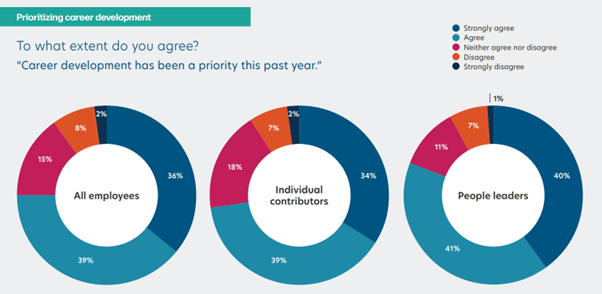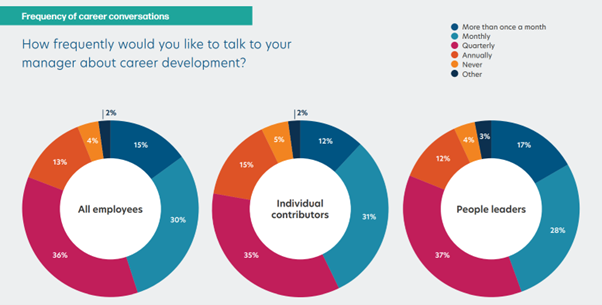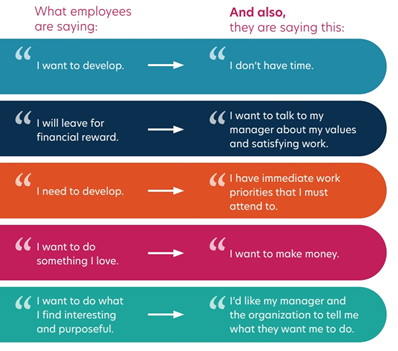Attracting and retaining the best talent is crucial for any organization striving for success and growth. The changing workforce and ever-growing skills gaps make this more important than ever. In response to this, GP Strategies surveyed over 2,000 employees and people leaders across the globe in early 2023 to get a perspective on the current state of career development.
The findings from this survey led to the emergence of four paradoxical themes about career development. This article explores those four key paradoxes and how this information can help you attract and retain the best talent for your organization.

Paradox #1: I’m more engaged in my current job when talking about my future.
With voluntary turnover numbers at some of the highest on record, it is clear that people are not afraid to move toward new opportunities or resign from traditional employment in favor of contract or gig work. However, you don’t need to lose the best people in your organization, provided you put in place measures to prioritize career and skills development in a way that supports your people. Across all populations and regions, for a large proportion of the workforce, career development is a priority.

The high prioritization of career could indicate a workforce full of employees focused on their needs or actively searching for a new job instead of contributing to their current organization.
However, our survey revealed that most people feel that career development greatly impacts their engagement in their current role. Career development opportunities are emerging as a key to driving employee engagement now, not just in the future.
Paradox #2: My values and strengths are important in my current job, and financial reward is important for my next job.
During discussions with their managers, 61% of employees reported wanting to focus more on their values and strengths and finding themselves more likely to engage with work they find satisfying.
It is easy for employee-focused career conversations to get side-lined, especially when managers want to discuss deliverables. But for employees, values remain prominent in manager-employee conversations, surpassing considerations like past roles, experience, compensation, and promotions. Historical data also consistently highlights the paramount importance of values in these interactions.
By understanding your people’s personal values, strengths, and desired growth areas, you will learn what matters to them. A genuine exchange between a leader and an employee about what matters most to the employee might be the most significant retention tool available.
Having said that, there is a definite emerging trend toward employees ranking compensation as increasingly important to them. Respondents indicated that financial reward is the top factor they will look for in a new position. These findings indicate that meeting values are increasingly important to your people, but you should not ignore the issue of competitive compensation.
Paradox #3: I need to have frequent conversations about what I want and what the organization wants.
It is clear that employees want to discuss their careers regularly. Unfortunately, there is often a big difference between the frequency they would like and the frequency at which the conversations actually happen.

You can learn about your people’s unique values, strengths, and aspirations through regular career conversations. Your most critical role as a leader is connecting organizational needs with your people’s aspirations and values.
We have also learned that employees want leaders to be champions for them and to connect them to opportunities. In fact, a massive 96% of people want their leaders to play some role in their career development. You can best deliver on this desire by genuinely understanding what is important to each of your people and actively helping them achieve their aims.
Paradox #4: My current priorities prevent me from prioritizing my development.
Fewer than half of the people who responded to our survey indicated they were spending the right amount of time on their careers. Investing in your people’s development will have a hugely positive impact both on your employees and your organization.
When asked whether they would take advantage of professional development opportunities if they were offered, our respondents were overwhelmingly positive. Almost three-quarters of people leaders and 70% of individual contributors said that they are likely or very likely to take advantage of development opportunities.

Unfortunately, people also do not feel they have the support they need to invest in professional development—and lack of time and competing resources are at the top of the list. Supporting your people’s career development can be difficult if you work in a culture of seeing it as an extra to the “real work” of your organization. But by creating a way of thinking that supports career development as integral to your company’s agenda, you can truly be there for your people and encourage them to thrive.
Discover How L&D Teams Can Future-Proof Their Leadership Strategy and Support Employee Development
How employees consider what they want out of their careers has fundamentally changed. We have learned that people want to fulfill their desire for interesting and meaningful work, and they want compensation. They want to be in regular discussions with their leaders about their work, career development, and open opportunities.
To attract and keep the best talent in your organization, it is vital that you are aware of and actively working on these aspects for your people. Leaders need to view career development as a fundamental part of their organization and the most important way of retaining their most valuable asset—their people.
To learn more about this study in paradox and discover deeper insights into our research, please download the 2023 Career Perspectives Report.
